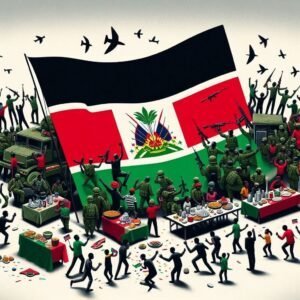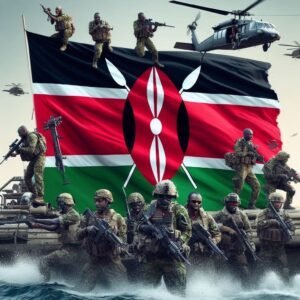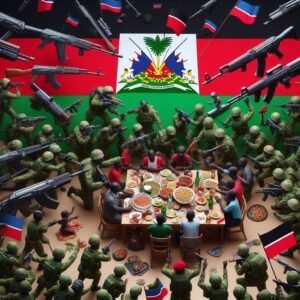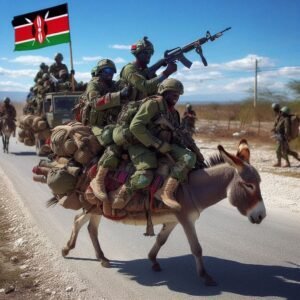Kenya’s participation in the United Nations peacekeeping mission in Haiti, MINUJUSTH, presents a striking paradox. While Kenyan troops work to maintain security and stability in Haiti, their own country grapples with significant security challenges, including terrorism, banditry, and ethnic violence. This article delves into the complexities of Kenya’s military intervention in Haiti, examining the motivations, implications, and contradictions of this paradox.
Kenya’s contribution to MINUJUSTH reflects its commitment to international peacekeeping and global governance. However, this commitment raises questions about the prioritization of security concerns and the allocation of resources. Should Kenya focus on addressing its own security challenges before intervening in another country’s affairs? The country faces significant threats from terrorist groups like Al-Shabaab, as well as internal conflicts and banditry, making it puzzling that Kenya can deploy troops to Haiti while struggling to restore security within its own borders.
Furthermore, the effectiveness of Kenya’s military intervention in Haiti is uncertain. Peacekeeping missions often face challenges in achieving sustainable peace, and Haiti’s complex political and social landscape presents unique difficulties. The Haitian people have expressed skepticism about the presence of foreign troops, and the mission’s impact on local communities is debated. In fact, the presence of Kenyan military in Haiti is perceived as ineffective and even laughable by the Haitian population, who view them as more focused on enjoying themselves than addressing security challenges.
This raises questions about the role of other international actors, such as the United States, which has a long history of involvement in Haiti. Why has the US chosen not to take the reins this time around? Is it fear of criticism, fear of being seen as occupiers, or a shift in foreign policy priorities? The US may be hesitant to take on a leading role again due to past criticisms of its handling of the earthquake response and subsequent interventions in Haiti. Alternatively, the US may be prioritizing other global hotspots or working behind the scenes to support a diplomatic solution or UN-led mission.
We most remembered that the United States’ previous intervention in Haiti following the devastating 2010 earthquake was marred by mismanagement of funds and a lack of effective relief efforts. Despite pledging billions of dollars in aid, much of the funding was allocated to US-based contractors and organizations, with little transparency or accountability. This mismanagement led to widespread criticism and accusations of neocolonialism. As a result, the US may be hesitant to take on a leading role in Haiti again, fearing similar criticism and scrutiny. However, this does not mean the US is entirely absent from the situation. Instead, they may be operating behind the scenes, influencing and guiding the Kenyan military’s efforts in Haiti, thereby maintaining a level of control and involvement without being directly in the spotlight.

The Haitian population is increasingly disillusioned with the Kenyan military’s presence, perceiving them as more interested in enjoying Haiti’s beaches and cuisine than addressing the country’s pressing security challenges. This stark contrast has created a sense of irony and mockery, as Haitian market vendors struggle to sell their goods and the population faces restricted movement due to gang control over auto circulation, forcing drivers to pay travel fees. Notably, Izo, a prominent Haitian hip-hop artist and gang leader, continues to produce music and flaunt his wealth without any problems, further highlighting the perceived ineffectiveness of the Kenyan military. Izo’s ability to openly showcase his lavish lifestyle, seemingly without fear of consequences, has become a symbol of the military’s failure to address the country’s security issues. Meanwhile, notorious gang leaders like Lanmo 100 Jou also continue to thrive, making payments to gang members without fear of consequences. The Kenyan military’s perceived inaction has exacerbated the situation, fueling widespread skepticism and disillusionment among Haitians.

In addition to these challenges, the United Nations Mission for Justice Support in Haiti (MINUJUSTH) was established in 2017, following the departure of the UN Stabilization Mission in Haiti (MINUSTAH). MINUJUSTH’s primary objectives include supporting the Haitian government in strengthening its rule of law institutions, promoting human rights, and improving security. The mission also aims to enhance the capacity of the Haitian National Police and assist in the country’s transition to a more stable and secure environment.
Despite the presence of Kenyan troops, Haiti’s security situation remains precarious. According to recent reports, gang violence and kidnappings have surged, with over 1,000 cases reported in the past year alone. Furthermore, the Haitian National Police has struggled to contain the spread of gang control, with many areas remaining inaccessible due to violence. These statistics raise questions about the effectiveness of Kenya’s military intervention and the need for a more comprehensive approach to addressing Haiti’s security challenges.

Kenya’s involvement in MINUJUSTH may be driven by a combination of diplomatic, strategic, and economic interests. As a key player in regional peacekeeping efforts, Kenya seeks to demonstrate its commitment to global governance and stability. Additionally, Kenya may be seeking to expand its influence in the Caribbean region and strengthen ties with Haiti. However, the true motivations behind Kenya’s involvement remain unclear, highlighting the need for greater transparency and accountability.
The presence of Kenyan troops in Haiti as part of the United Nations peacekeeping mission has been met with skepticism and criticism from the Haitian population. Despite the mission’s objective to maintain security and stability, many Haitians believe that the foreign troops have done little to address the root causes of their country’s insecurity.
One Haitian market vendor aptly summarized the sentiment, stating, “The Kenyan military is more focused on enjoying Haiti’s beaches than addressing our security challenges.” This perception suggests that the Kenyan troops are not taking the security situation seriously, and are instead indulging in the comforts of Haiti.
Furthermore, the gangs that have been controlling various aspects of Haiti for a while have made it clear that they are ready to fight and resist foreign intervention. Their willingness to engage in conflict and their knowledge of the terrain, which they refer to as the “land of Papa Dessalines,” adds complexity to the situation. The Kenyan military’s slow response to the insecurity in Haiti has raised concerns about the success of the mission.

The situation on the ground is dire, and the outcome of the mission is uncertain. The Kenyan military’s intervention in Haiti can be likened to a “mission impossible,” with the odds stacked against them. The comparison to a movie highlights the sense of unpredictability and suspense surrounding the mission’s outcome.
In conclusion, the Kenyan military intervention in Haiti has been met with skepticism and criticism. The perceived ineffectiveness of the troops in addressing the root causes of insecurity, combined with the complexity of the situation on the ground, has raised concerns about the success of the mission. It is crucial for the international community, including Kenya and the United Nations, to reassess their approach to addressing Haiti’s security challenges. A more comprehensive and inclusive strategy that involves the Haitian population and addresses the root causes of insecurity is necessary to avoid another failed mission.

But the question remains, are the gangs in Haiti really that powerful to stand against the UN, or is the UN still playing a cat-and-mouse game? It has been too long since Haiti’s security situation has been in disarray, and the people are tired. Haiti’s strategic location in the Caribbean, its historical significance as the first independent black nation, and its potential as a key player in regional trade and commerce make it a critical partner for the United States. With a stable and secure Haiti, the country could develop ports and airports that would not only benefit the region but also provide a valuable outlet for US trade and commerce. Moreover, Haiti’s skilled and dedicated workforce could be a valuable asset for US businesses, providing a competitive edge in the global market. By investing in Haiti’s security and stability, the US can tap into the country’s vast potential and create a win-win situation for both nations. If the US can provide significant support to Ukraine to resist Russia and Vladimir Putin, why can’t they provide similar assistance to Haiti, a nation that has been a symbol of resistance against oppression and a beacon of hope for democracy in the region? The international community’s response to Haiti’s crisis has been lackluster, and it is time for a more robust and effective approach to restore security and stability to the island nation. The Haitian people deserve better, and it is their inherent right to live in peace, safety, and prosperity. While the primary responsibility for restoring peace lies with the Haitian people, the international community has a moral obligation to support and assist them in this endeavor. It is imperative that the UN acts swiftly to prevent further devastation, and the global community must rally together to ensure the safety, well-being, and prosperity of the Haitian people in their time of need. The world cannot afford to stand idly by as Haiti struggles; collective action is necessary to prevent a humanitarian crisis and secure a brighter future for the Haitian people.

Samuel Georges
The post Kenya’s Mission impossible: Peacekeeping in Haiti’s Turbulent Landscape appeared first on Transparansmm.

